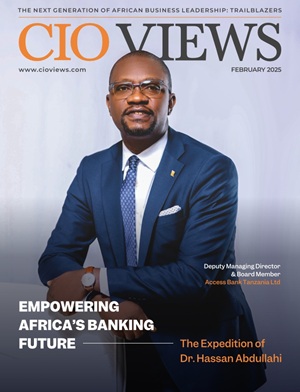
As consumers increasingly examine companies’ values and seek more than just a paycheck from their employers, a new paradigm has emerged in leadership: purpose-driven leadership. Dipu Mukherjee, Chief Innovation Officer, acknowledges and professes that business can and should be a force for good. Mukherjee has seamlessly woven social impact into the fabric of business operations, demonstrating that doing good and doing well are not mutually exclusive but mutually reinforcing.
A Philanthropic Ethos at the Core
His leadership philosophy is deeply character-based, with an unwavering commitment to social responsibility. Mukherjee believes businesses have a moral obligation to contribute positively to society. His involvement extends beyond his role on the Board of Directors at Bryan’s House. He actively collaborates with the staff and CEO to optimize operations, consolidating redundant software to save costs and redirect resources toward vital childcare initiatives. This hands-on approach, coupled with efforts like 3D printing masks for healthcare workers during the pandemic, demonstrates his genuine desire to make a tangible difference.
“I feel that every one of us has a duty and responsibility to give back,” said Mukherjee. “As business leaders, we can positively impact by leveraging resources and influence.” This is not just an ethos he believes in; it is a basic tenet guiding his leadership approach and decisions.
Adding Richness to the Philanthropic Side:

Mukherjee’s commitment to philanthropy is further exemplified by his recent actions. On October 12th, he visited the University of Tennessee, his alma mater, to meet with the recipient of the Mukherjee Family Data Science scholarship. This scholarship, established by Mukherjee, provides financial assistance to promising students pursuing a degree in data science. (See attached picture with the scholarship recipient.)
Following the meeting, Mukherjee attended the Tennessee Volunteers vs. Florida Gators football game at Neyland Stadium. While there, he connected with Chancellor Donde Plowman of the University of Tennessee to discuss ongoing initiatives and future collaborations. (See attached picture with Chancellor Plowman.) This personal engagement with the university and its students highlights Mukherjee’s dedication to fostering educational opportunities and supporting the next generation of data scientists.

His volunteer work with Ride2Vote further exemplifies this commitment, where he helps ensure elderly and transportation-challenged individuals can exercise their right to vote. During the COVID-19 pandemic, Mukherjee selflessly provided transportation to vaccination sites for individuals and families, risking his health to help protect his community. These actions underscore his deep compassion and dedication to the well-being of others.
Integrating Social Impact into Business: The Mukherjee Model
Mukherjee is a leader who integrates social impact into the core of his business strategy. This isn’t about an after-the-fact charity add-on; it’s baking purpose right into the DNA of the business.
- Purpose-Driven Innovation: Mukherjee is a proponent of creating goods and services that address society’s issues and requirements. A prime example is his keen interest in using AI and machine learning to ensure the common good for himself and his team. For him, innovation fulfills a role in this regard, guaranteeing that technological advancement benefits society.
- Employee Engagement and Empowerment: Mukherjee understands that employees are better motivated and more productive when they can feel and believe their work serves a greater purpose. He builds on a sense of social responsibility by encouraging employees to volunteer for and provide financial resources for causes they want to support.
- Community Partnerships: Mukherjee is always looking to partner with non-profit organizations and community groups because he realizes that partnerships create value for everyone in the community. Partnerships with businesses allow them to better utilize their resources and expertise in dealing with some of society’s intractable problems.
- Sustainability practices: Mukherjee supports and practices sustainability in business, realizing that long-term success is invariably based on proper environmental care. He integrates sustainability into the business strategy to ensure the company’s operations cause minimal harm to the planet and contribute to a healthy future.
Business Case for Creating Social Impact: A Win-Win Situation
Mukherjee’s approach challenges the age-old dogma that social responsibility goes against profitability. Numerous pieces of evidence show that businesses with a sense of purpose meet societal needs and enjoy massive benefits.
- Research has proven that companies with high levels of purpose outperform the market by 42%. Consumers are increasingly voting with their wallets, and 71% are more likely to buy from brands aligning with their values.
- Empty, unmotivated, and unhappy employees hinder success. Studies indicate that purpose-driven companies see employee engagement scores three times higher than their competitors.
- Authentic, sustainable practices are equally suitable for the bottom line: firms with robust sustainability programs are proving more profitable and have higher market valuations.
A Call to Action for Business Leaders
Dipu Mukherjee exemplifies what business can be: an active agent of change. His story underlines a significant fact: social impact and economic success do not stand in opposition but serve a complementary function given a sustainable business model.
This is a high moment of social awareness, and it presents an opportunity for business leaders to rethink the role and purview of corporations vis-à-vis society. Herein lies an opportunity for leaders to fully manifest purposeful leadership embedded in core strategies and value creation that will endure for stakeholders, communities, and the world. The future of business lies in serving shareholders and society in general.



















